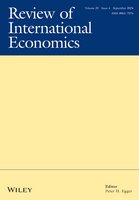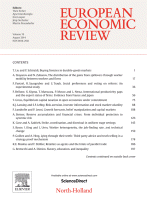Prof. Dr. Andreas Steiner | Professor für Internationale Wirtschaftsbeziehungen
General:
Room:
N-1-12
Email:
Andreas.Steiner(at)hs-rm.de
Phone:
+4961194953149
Postal Address:
Postfach 3251
65022 Wiesbaden
Address:
Bleichstraße 44
65183 Wiesbaden
Hours:
nach Vereinbarung
- Assistant professor in International Monetary Macroeconomics (tenured), Department of Global Economics and Management, Faculty of Economics and Business, University of Groningen (2016-2024)
- Researcher at the ifo Institute, Center for Business Cycle Analysis and Surveys, Munich (2015-2016)
- Assistant professor at the chair of International Economic Policy, University of Osnabrück and member of the Institute of Empirical Economic Research, University of Osnabrück (2009-2015)
- Dr. rer. pol., University of Mannheim, Center for Doctoral Studies in Economics (2009)
- International monetary macroeconomics
Publications in refereed journals


- “Capital Flow Reversals and Currency Crises: Do Capital Flow Types Matter?” (with Mengting Zhang, Jakob de Haan and Haizhen Yang), Review of International Economics 32,4 (2024): 1787–1823.
DOI: https://doi.org/10.1111/roie.12753
- “Monetary Policy When the Zero Lower Bound Is Within Reach: A Smooth Transition Regression Approach”, Macroeconomic Dynamics 25, 1 (2021): 201-212.
DOI: https://doi.org/10.1017/S1365100518000718.
- “Exit Strategies, Capital Flight and Speculative Attacks: Europe's Version of the Trilemma” (with Sven Steinkamp and Frank Westermann), European Journal of Political Economy 59 (2019): 83-96.
DOI: https://doi.org/10.1016/j.ejpoleco.2019.02.003
- “International Reserves and the Maturity of External Debt” (with Xingwang Qian), Journal of International Money and Finance 73, PB (2017): 399-418.
DOI: https://doi.org/10.1016/j.jimonfin.2017.02.015
- “Central Banks and Macroeconomic Policy Choices: Relaxing the Trilemma”, Journal of Banking and Finance 77 (2017): 283-299.
DOI: https://doi.org/10.1016/j.jbankfin.2015.07.005
- “Does the Accumulation of International Reserves Spur Inflation? A Reappraisal”, North American Journal of Economics and Finance 41 (2017): 112-132.
DOI: https://doi.org/10.1016/j.najef.2017.03.007
- “Reserve Accumulation and Financial Crises: From Individual Protection to Systemic Risk”, European Economic Review 70 (2014): 126-144.
DOI: https://doi.org/10.1016/j.euroecorev.2014.04.005
- “International Reserves and the Composition of Equity Capital Inflows” (joint with Xingwang Qian), Review of International Economics 22, 2 (2014): 379-409.
DOI: https://doi.org/10.1111/roie.12113
- “Current Account Balance and Dollar Standard: Exploring the Linkages”, Journal of International Money and Finance 41 (2014): 65-94.
DOI: https://doi.org/10.1016/j.jimonfin.2013.10.005
- “The Accumulation of Foreign Exchange by Central Banks: Fear of Capital Mobility?”, Journal of Macroeconomics 38, Part B (2013): 409-427.
DOI: https://doi.org/10.1016/j.jmacro.2013.08.002
- “How Central Banks Prepare for Financial Crises - An Empirical Analysis of the Effects of Crises and Globalization on International Reserve Holdings”, Journal of International Money and Finance 33 (2013): 208-234.
DOI:https://doi.org/10.1016/j.jimonfin.2012.11.012
- “Do Dynamics and Heterogeneity in Panel Data Models Matter? An Application to Central Banks’ Demand for International Reserves”, Empirical Economics 40, 1 (2011): 165-176.
DOI: https://doi.org/10.1007/s00181-010-0423-2
- “Contagious Policies: An Analysis of Spatial Interactions Among Countries’ Capital Account Policies“, Pacific Economic Review 15, 3 (2010): 422-445.
DOI: https://doi.org/10.1111/j.1468-0106.2010.00511.x
- also check my entry on IDEAS/RePEc: Economics and Finance Research
Bachelor International Management
- Introduction to International Economic Relations (3rd semester)
- Problems in Economic Development (4th semester)
- European Integration & European Sustainability Economics (5th semester)
- Thesis supervision
Master International Management
- Managerial Economics
- Thesis supervision
Index of private financial openness
Description
Database of the index of countries’ private financial openness (PRIFO). The index is defined as the sum of countries’ private foreign assets and private foreign liabilities divided by GDP. This measure is market-based because it focuses on private agents' willingness and ability to invest abroad and to incur foreign debt. See Steiner (2021) for details.
Reference:
Steiner, Andreas (2021), “Measuring De Facto Financial Openness: A New Market-Based Indicator and Its Application,“ University of Groningen, mimeo.
Date made available 2022
Temporal coverage 1970 - 2020
Date of data production 2022
Geographical coverage Global
Keywords on dataset
Financial openness; Financial integration; Private versus official capital